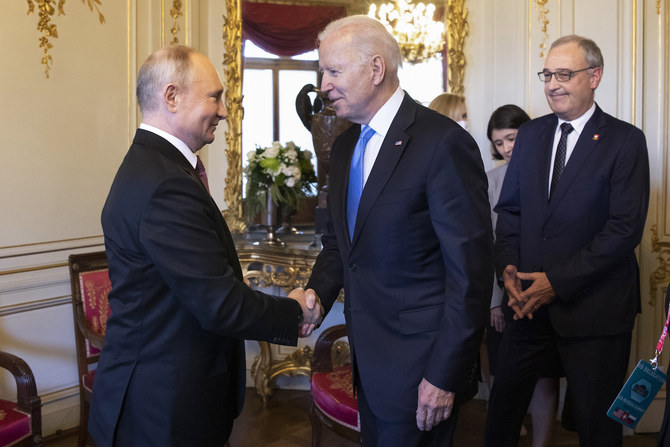GENEVA: US President Joe Biden and Russian President Vladimir Putin agreed at a “pragmatic” first summit on Wednesday to resume arms control talks and to return ambassadors to each other’s capitals after they were withdrawn earlier this year.
The discussions at the lakeside Villa La Grange in Geneva lasted less than four hours — far less than Biden’s advisers had said they expected.
Putin called Biden, 78, a constructive, experienced partner, and said they spoke “the same language,” but added that there had been no friendship, rather a pragmatic dialogue about their two countries’ interests.
He said it was “hard to say” if relations with the United States would improve, but that there was a “glimpse of hope” regarding mutual trust. There were no invitations to Washington or Moscow
The scheduling of separate news conferences meant there was none of the joviality that accompanied a 2018 meeting in Helsinki between Putin and Biden’s predecessor, Donald Trump, where Putin presented Trump with a soccer ball. There was also no shared meal.
Putin, 68, who was first to brief reporters, said the meeting had been constructive, without hostility, and had showed the leaders’ desire to understand each other.
He also said Russia and the United States shared a responsibility for nuclear stability, and would hold talks on possible changes to their recently extended New START arms limitation treaty.
But he showed little appetite for compromise on a range of other issues, dismissing Washington’s concerns about the arrest of opposition figurehead Alexei Navalny, about Russia’s increased military presence near Ukraine’s eastern border, and about US suggestions that unidentified Russians are responsible for a series of cyber-attacks in the United States.
Putin said Navalny had ignored the law and had known what would happen if he returned to Russia from Germany, where he had received treatment for an attempt inside Russia to kill him with poison. He also accused Kyiv of breaking the terms of a cease-fire agreement with pro-Russian rebels in eastern Ukraine.
The Kremlin leader said Washington and Moscow would start consultations on cybersecurity, adding that most cyber-attacks on Russia came from the United States.
He said Biden had raised human rights issues and also the fate of US citizens jailed in Russia. Putin said he believed some compromises could be found, although he gave no indication of any prisoner exchange deal.
ARMS CONTROL PROGRESS
Arms control is, however, one domain where progress has historically been possible despite wider disagreements.
In February, Russia and the United States extended for five years the New START treaty, which caps the number of strategic nuclear warheads they can deploy and limits the land- and submarine-based missiles and bombers to deliver them.
Both sides had said in advance of the summit that they hoped for more stable and predictable relations, even though they were at odds over everything from arms control and cyber-hacking to election interference and Ukraine.
Putin and Biden shook hands on arrival before going inside, and Biden flashed a ‘thumbs-up’ to reporters as he left the villa where the talks were held and got into his limousine.
The first round of talks — which included Biden, Putin, US Secretary of State Antony Blinken and Russian Foreign Minister Sergei Lavrov — lasted almost two hours, officials said.
Talks resumed after a break at around 4 p.m. (1400 GMT), with Moscow’s ambassador to the United States, Anatoly Antonov, who was recalled to Russia in March, among those present. That round ended at 5:05 p.m. (1505 GMT).
Relations between Moscow and Washington have been deteriorating for years, notably with Russia’s 2014 annexation of Crimea from Ukraine, its 2015 intervention in Syria and US charges — denied by Moscow — of meddling in the 2016 election that brought Donald Trump to the White House.
They sank further in March when Biden said he thought Putin was a “killer,” prompting Russia to recall Antonov to Washington for consultations. The United States recalled its ambassador in April.
Putin said on Wednesday that he had been satisfied by Biden’s explanation of the remark.
Trump’s summit in 2018 with Putin in Helsinki had included a meeting accompanied only by interpreters, but Biden and Putin had no solo talks.
Standing beside Putin in Helsinki in 2018, Trump refused to blame him for meddling in the 2016 US election, casting doubt on the findings of his own intelligence agencies and sparking a storm of domestic criticism.
















